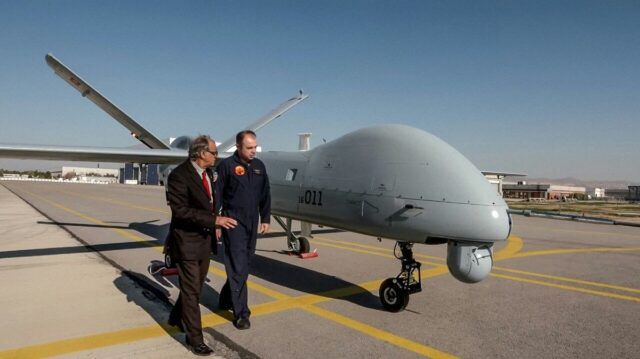
Kazakhstan and Turkey Make Steady Progress in Expanding Military Cooperation
Publication: Eurasia Daily Monitor Volume: 20 Issue: 192
By:

On November 28, Kazakhstan’s Defense Ministry declared that the process of selecting a domestic company for the production of Turkish combat drones was already underway (Kazinform, November 28). The statement confirmed earlier news that the production of Turkish Anka unmanned aerial vehicles (UAVs) in Kazakhstan will start in 2024. Astana and Ankara had reached an agreement to co-produce these drones in May 2022. At the time, Kazakhstan Engineering and Turkish Aerospace Industries signed a memorandum of understanding on military-technical cooperation and announced plans to build an assembly and maintenance line in Kazakhstan (Informburo.kz, October 15). With the deal, Kazakhstan will become the first foreign country to locally produce Turkish combat drones. A representative of Turkish Aerospace Industries stated that the company’s goal is “to transfer experience and technology so that Kazakhstan can independently produce unmanned aerial vehicles in the future” (Informburo.kz, October 15). The production of Turkish combat drones highlights Astana and Ankara’s concerted efforts to increase their military and security cooperation as Russian regional influence recedes and as part of Kazakhstan’s multi-vector foreign policy (see EDM, January 3).
Turkey and Kazakhstan have enjoyed over 30 years of military and security cooperation. Turkey was the first state to recognize Kazakhstan’s independence in 1991 and swept into Central Asia with grand plans for multilateral cooperation. The first bilateral intergovernmental agreement on military cooperation was signed in 1993. It included sending Kazakhstani army officers to Turkey for training. By 2019, 200 officers from Kazakhstan had received military training (Kapital.kz, December 5, 2019). In the late 1990s, Turkey started providing Kazakhstan with small grants to modernize its military. The grants ranged between $500,000 and $1.5 million and were designated for capacity-building and technical support projects (Cyberleninka.ru, accessed December 19). Joint projects, however, were limited. Russia’s heavy influence in the region hampered Turkey’s plans to ramp up military cooperation with Kazakhstan and the other Central Asian states.
A breakthrough in Turkish-Kazakhstani defense cooperation came in 2011 when the two countries signed an agreement to launch a joint venture to produce military-industrial products. In 2013, Turkish state enterprise Aselsan and Kazakhstan Engineering unveiled the Kazakhstan Aselsan Engineering plant. The facility produces communications and surveillance equipment, automated command and control systems, combat modules, electronic warfare equipment, avionics systems, as well as maritime and civil control systems for law enforcement (Forbes.kz, July 25).
The May 2022 deal for Kazakhstan’s production of Turkish Anka drones marks the recent expansion of joint military projects between the two sides. Russia’s full-scale invasion of Ukraine in February 2022 has significantly diminished Moscow’s presence in Central Asia. The Kremlin’s traditional regional allies have begun reconsidering their military engagements with Russia, opening the door for Turkey to expand its footprint in the region. Kazakhstan is not the only country in the region to launch an assembly line for foreign combat drones. In May 2022, Tajikistan started producing Iranian Ababil-2 tactical drones (Asiaplus.tj, May 17, 2022).
Kazakhstan and Turkey’s growing military cooperation is set to move beyond the local production of drones. For example, at the end of July 2023, Kazakhstani state enterprise Uralsk Plant Zenit signed an agreement with two companies under the Turkish Ministry of National Defense, Asfat and YDA Group, to build ships for Kazakhstan’s navy (Kursiv Media, November 15).
The budding military cooperation with Turkey comes as a result of Kazakhstan’s efforts to strengthen its defense-industrial complex through creating a production cycle based on localization to reduce dependence on imports. In September, Kazakhstani President Kassym-Jomart Tokayev highlighted that the country’s army needs “high-tech weapons and military equipment, including armored vehicles, unmanned aerial vehicles, and modern small arms.” He added, “It is necessary to strengthen production capacities for the rapid repair of equipment and strengthen support for domestic enterprises” (Tengrinews.kz, September 1).
Turkey is not the only country that Kazakhstan has turned to for technical expertise and modern technologies. In August, Kazakhstan’s Petropavlovsk Heavy Engineering Plant launched local production of six different drones that can be used for military and civic purposes. The plant has partnered with China to source critical parts, but production takes place in Kazakhstan (Sputnik.kz, August 23). In November, Kazakhstani Defense Minister Ruslan Zhaksylykov revealed plans to co-produce combat drones together with South Korea in Kazakhstan without providing any further details (Kursiv Media, November 15). Kazakhstan’s military and defense relationships mirror the government’s overall multi-vector approach to foreign policy. Overall, the country’s fleet of drones currently consists of Russian Orlan-10, Turkish Anka, Israeli Skylar I-LEX, Chinese Wing Loong 1, and US RQ-11 Raven drones (Vestnik Kavkaza, November 29, 2022).
Turkish combat drones are some of only a few UAVs to have proven their effectiveness in real combat scenarios in Ukraine, the Middle East, and the South Caucasus. Kazakhstan’s plans to localize production is a clear sign of its steadily growing military and defense cooperation with Turkey. In parallel, Astana is engaging with other partners to adopt the modern technologies and technical expertise needed to localize more of its defense production. Russia’s diminishing influence due to its war against Ukraine has opened the door for Kazakhstan to expand its multi-vector foreign policy and explore new defense partnerships.



